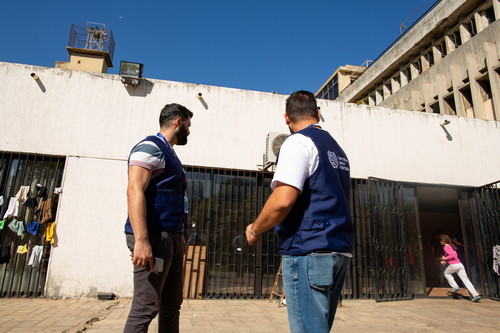من خلال العمل مع شركائها الوطنيين، تعمل خطة الاستجابة الطارئة لمنظمة العمل الدولية على إعداد الأرضية للتعافي على المدى الطويل.
بيروت، 12 تشرين الثاني/ نوفمبر2024 (أخبار منظمة العمل الدولية) – تنفذ منظمة العمل الدولية خطة طوارئ متعددة الأبعاد للاستجابة للأزمة المتصاعدة في لبنان، كجزء من استجابة الأمم المتحدة الأوسع في البلاد.
وتتمحور خطة الاستجابة للطوارئ حول تعزيز الحماية الاجتماعية من خلال تقديم مزايا نقدية فورية، وإعادة تأهيل البنية التحتية في المباني التي تستخدم كملاجئ، وعلى نطاق أوسع دعم الوظائف والمؤسسات وسبل العيش، بما يتماشى مع ولاية منظمة العمل الدولية لتعزيز الحماية الاجتماعية وضمان فرص العمل اللائق والاستدامة الاقتصادية على المدى الطويل.
وقد أدى القتال إلى نزوح أكثر من 1.2 مليون شخص، وهو ما يعادل أكثر من 20 في المائة من إجمالي سكان البلاد، وثلثيهم من الأطفال والنساء.
وقالت د. ربا جرادات، المدير الإقليمي للدول العربية في منظمة العمل الدولية: “لقد وصل الوضع الإنساني في لبنان إلى مستويات غير مسبوقة. فقد قُتل وجُرح آلاف المدنيين. ويحتاج لبنان وسكانه إلى دعم فوري ومؤثر للتخفيف من آثار هذا الصراع. ولم تدخر منظمة العمل الدولية أي جهد في العمل جنبًا إلى جنب مع الجهات الفاعلة الوطنية والدولية لدعم الحكومة والعمال وأصحاب العمل. استجابة منظمة العمل الدولية الطارئة تكمل الاستجابة الإنسانية وتمهد الطريق للتعافي”.
الخطة مدعومة من قبل مشاريع منظمة العمل الدولية الجارية بالفعل في لبنان، باستخدام الموارد الداخلية للمنظمة، والأموال المعاد توجيهها من الاتحاد الأوروبي وألمانيا وهولندا والسويد والمملكة المتحدة. ويجري تنفيذها بالتعاون مع السلطات الوطنية والمحلية وشركاء الأمم المتحدة ومنظمات العمال وأصحاب العمل.
وقالت جرادات: “أود أن أعرب عن عميق امتنان منظمة العمل الدولية لشركائنا في التنمية على دعمهم لخطة الاستجابة الهامة هذه”.
تعمل خطة الاستجابة لمنظمة العمل الدولية على تحسين الظروف المعيشية للأسر النازحة في مراكز الإيواء الجماعية، مع توفير فرص العمل لأفراد من المجتمع المحلي في محيط الملاجئ. وتشمل الأعمال أعمال البناء والترميم والتنظيف والطهي الجماعي وتجهيز المباني المستخدمة كملاجئ لأشهر الشتاء القادمة. وتكتسب الخطة أهمية خاصة في ضوء الأزمة المالية والاقتصادية التي شهدها لبنان منذ عام 2019، والتي أثرت بشكل كبير على مؤسسات البلاد والخدمات العامة وسوق العمل ونظام الحماية الاجتماعية. كما أدت أزمة النزوح الحالية إلى زيادة الضغط على موارد البلاد الشحيحة أصلا.
وتتضمن خطة الاستجابة للطوارئ تدابير فورية اتخذتها منظمة العمل الدولية بالشراكة مع وزارة الشؤون الاجتماعية واليونيسف، لتعزيز دعم الحماية الاجتماعية للفئات السكانية الضعيفة، مثل المدفوعات المسبقة لأكثر من 27000 شخص من ذوي الإعاقة، ومدفوعات تكميلية طارئة إضافية لأكثر من 5000 مستفيد، كما تتضمن خطة لتوسيع المساعدات النقدية الطارئة لعشرات الآلاف من الأشخاص الآخرين. كما تتعاون منظمة العمل الدولية مع الصندوق الوطني للضمان الاجتماعي ووكالات الأمم المتحدة لتعزيز كفاءة التأمين الصحي للصندوق، بهدف توسيع الحماية الصحية الاجتماعية للنازحين والمتضررين هذا الشهر.
بالإضافة إلى ذلك، تدعم منظمة العمل الدولية ووزارة الزراعة اللبنانية المزارعين في الحفاظ على الإنتاج الزراعي الحيوي وحماية الوظائف الزراعية وسبل العيش القائمة من خلال تمكينهم من الوصول إلى الموارد اللازمة للإنتاج الزراعي ومرافق التخزين والأسواق. كما تدير منظمة العمل الدولية دورات مهنية فنية في الطهي وإنتاج معدات الشتاء، مما يوفر للعمال مهارات جديدة وفرص عمل مع تزويد النازحين بالطعام والمواد الأساسية.
وتعمل منظمة العمل الدولية مع الاتحاد العمالي العام اللبناني والاتحاد الوطني لنقابات العمال والمستخدمين في لبنان على إنشاء خلايا للأزمات وتقديم الدعم إلى النازحين من أعضائها، مع التركيز بشكل خاص على العمال المهاجرين الذين غالبًا لا يتمكنون من اللجوء إلى مزاكز الأيواء التي تديرها الحكومة. كما تدعم جمعية الصناعيين اللبنانيين وتعزز قدرتها على تلبية احتياجات الشركات ودعم المجتمعات النازحة بشكل أفضل.
ولتقييم تأثير الحرب على العمال والمؤسسات في لبنان، تجري منظمة العمل الدولية، بالتعاون مع منظمات العمال وأصحاب العمل، تقييماً سريعاً يستخدم المسوحات والمقابلات النوعية، بهدف تمكين وضع السياسات والتدخلات وتعزيز الاستقرار الاقتصادي والمرونة في سوق العمل.
ILO responds to Lebanon crisis with emergency assistance to displaced people
Working with its national partners, the ILO’s Emergency Response Plan prepares the ground for long-term recovery.
BEIRUT, 12 November 2024, (ILO News) – The ILO is implementing a multi-dimensional emergency plan to respond to the escalating crisis in Lebanon, as part of the wider UN response in the country.
The Emergency Response Plan centres on enhancing social protection through immediate cash benefits, rehabilitating infrastructure at shelters housing displaced people, and more broadly sustaining jobs, enterprises and livelihoods, in keeping with the ILO’s mandate to advance social protection and ensure decent work opportunities and long-term economic sustainability.
The violence has displaced over 1.2 million people, which is the equivalent of more than 20 percent of the country’s total population, two thirds of whom are children and women.
“The humanitarian situation in Lebanon has reached unprecedented levels. Thousands of civilians have been killed and injured. Lebanon and its residents are in need of immediate and impactful support to mitigate the effects of this conflict. The ILO has spared no effort in working alongside national and international actors to support the Government, workers and employers. The ILO’s emergency response complements the humanitarian response and prepares the ground for recovery,” said ILO Regional Director for Arab States Ruba Jaradat.
The Plan is supported by ILO projects already underway in Lebanon, using internal resources and repurposed funds from the EU, Germany, the Netherlands, Sweden and the United Kingdom. It is being implemented in collaboration with national and local authorities, UN partners and worker and employer organizations.
“I extend the ILO’s deep gratitude to our development partners for their support of this crucial response plan,” Jaradat said.
The ILO response plan works to enhance living conditions for displaced families in collective shelters, while providing work opportunities for local community members within the vicinity of the shelters. Works include construction, refurbishment, clearing and cleaning works, communal cooking, and preparing buildings used as shelters for the upcoming winter months. The plan is especially vital in light of the financial and economic crisis Lebanon has witnessed since 2019, which has dramatically impacted the country’s institutions, public services, labour market and social protection system. The current displacement crisis has further strained the country’s already meagre resources.
The Emergence Response Plan includes immediate measures the ILO has taken in partnership with the Ministry of Social Affairs and UNICEF, to enhance social protection support vulnerable populations, such as advance payments to over 27,000 persons with disabilities, additional emergency top-up payments to over 5,000 beneficiaries, and a planned expansion of the emergency cash assistance to tens of thousands of others. The ILO is also collaborating with the National Social Security Fund (NSSF) and UN agencies to enhance the NSSF’s health insurance efficiency, aiming to expand social health protection for displaced and affected populations this month.
In addition, the ILO and the Lebanon Ministry of Agriculture are also supporting farmers in maintaining vital agricultural production and safeguarding existing agricultural jobs and livelihoods by providing them with access to resources necessary for agricultural production, storage facilities and markets. The ILO is also running technical vocational courses in cooking and winter kit production, providing workers with new skills and job opportunities while supplying displaced people with food and essential items.
The ILO is working with the General Confederation of Lebanese Workers (CGTL) and the National Federation of Workers’ and Employees’ Trade Unions of Lebanon (FENASOL) in establishing crisis cells, and providing support to their displaced members, with a special focus on migrant communities who are often not able to access government-run shelters. It is also supporting the Association of Lebanese Industrialists (ALI) and strengthening its capacity to address the needs of enterprises and better support displaced communities.
To assess the full impact of the war on Lebanon’s workers and enterprises, the ILO, in collaboration with workers’ and employers’ organizations, is also conducting a rapid assessment that uses surveys and qualitative interviews, to eventually inform policies and interventions and strengthen economic stability and resilience in the labour market.

